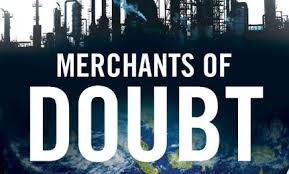The Anticommunist Origins of Climate Denial
How Cold Warriors Wind Up Heating the Planet
 The other night, my wife and I saw Merchants of Doubt, Robert Kenner’s new film about the climate denial industry. I thought it was excellent. I was surprised by the high production values and the way in which it did not feel like a documentary, at least until the last 15-20 minutes or so. (Then it began to remind me of a Frontline segment.) Former Republican Congressmember Bob Inglis of South Carolina, a die-hard conservative who lost his seat when he began to advocate for grappling with climate change (as well as the DREAM Act), comes off as particularly thoughtful.
The other night, my wife and I saw Merchants of Doubt, Robert Kenner’s new film about the climate denial industry. I thought it was excellent. I was surprised by the high production values and the way in which it did not feel like a documentary, at least until the last 15-20 minutes or so. (Then it began to remind me of a Frontline segment.) Former Republican Congressmember Bob Inglis of South Carolina, a die-hard conservative who lost his seat when he began to advocate for grappling with climate change (as well as the DREAM Act), comes off as particularly thoughtful.
For me, the most interesting part was the discussion of Fred Singer, a physicist who is a leading climate denial rock star, and the late Fred Seitz, another distinguished scientist who was also a climate denier. Why, the movie asks, do the handful of scientists who deny climate science do so? (and it really is no more than handful despite the denial industry’s attempt to show the contrary).
Naomi Oreskes, upon whose book of the same name the movie is based, argues in the film that although they get a certain amount of money from fossil fuel interests, that does not really explain their position, and I agree with her. For Oreskes, it stems from Cold War ideology – an anti-communism that makes them hate, fear, and then deny the existence of any problem that would require government intervention. That is persuasive to me: Seitz began to fall out with the scientific community over his strong advocacy of the Vietnam War. But I think something else might be in order.
You didn’t hear from Singer and Seitz anything about the dangers of government intervention when the Clean Air Act was debated (it passed the Senate nearly unanimously in 1970, and Singer was the deputy assistant administrator for EPA at that time) or even with Montreal Protocol (which as former Secretary of State George Shultz pointed out in a good op-ed on Friday, was negotiated during his tenure in the Reagan Administration).
Ironically, this sort of Cold War ideology really erupted after the Cold War ended. If you are a Cold Warrior and your enemy collapses, what do you do? You look for another enemy. If the Soviet Union still exists, then you know where your enemy is. But if it collapses, and if you are of a Cold War bent, you look for other places where the Evil Empire has gone into hiding. There is a thrashing-about quality of old Cold Warriors. Who is the existential Enemy? Is it Russia? China? Iran? Iraq? David Frum (who has since become much more thoughtful) just threw in the kitchen sink with the “axis of evil”. It doesn’t matter how poor or how weak the country is: it is a threat on par with Hitler and Stalin. With climate, it is some sort of vague Vast Left-wing Conspiracy designed to rob us of our precious bodily fluids.
I have written before suggesting that the climate issue provides ideological glue to hold together Movement Conservatism’s “three-legged stool.” Anti-communism was the best: 1) billionaires hated it because it threatened their wealth; 2) conservative Christians hated it because it was godless; and 3) neoconservatives hated it because they needed an enemy. With climate, 1) billionaires hate it because it is government regulation (even if it is very light); 2) conservative Christians hate because of their suspicions of modern science; and 3) neoconservatives hate it because grappling with it requires international cooperation anathema to them.
But because climate change isn’t quite as good, that requires crazier and crazier positions to make up for it. I think that this often happens, too: when someone takes a position, and it turns out to be false, they often double down on it to show that they were really right to begin with. This is what happened with torture advocacy: desperate people trying to preserve national security agreed to torture a few select prisoners, and when that didn’t work, they had to show that they were right, and so wound up approving a massive torture program.
Fred Singer and Fred Seitz sort of straddle the billionaire and neoconservative legs of the Movement Conservative stool. That makes sense: ideological schema rarely play out neatly in the real world. And when you spend your time with people on “your side,” you begin to adopt their positions. Thus, conservative Christians are now adopting the plutocratic ideology of billionaire Republicans – even if that is about as far from the New Testament as one can get.
As Michael Shermer of Skeptic Magazine, who is interviewed in Merchants of Doubt, puts it: you buy the package of your team. And I suppose that’s the challenge for everyone involved in academia and public policy, no matter what their ideological priors: how to be a productive member of the team without becoming subsumed by it.
Reader Comments
3 Replies to “The Anticommunist Origins of Climate Denial”
Comments are closed.







If you attack the people with whom you disagree, you don’t advance rational argument. Merchants of Doubt – the book and the film – are a collection of ad hominem attacks on those who have not been persuaded to jump on the catastrophic anthropogenic climate change (CAGW) bandwagon.
You write of the movie’s portrayal of “a physicist who is a leading climate denial rock star, and the late Fred Seitz, another distinguished scientist who was also a climate denier. Why, the movie asks, do the handful of scientists who deny climate science do so.”
You are accusing those who you disagree with your [and Oreskes’] views – whatever those might be – of “denying climate” and of “denying climate science?”
That’s a little reckless, don’t you think? Very few people would deny climate. And very few would say there is no climate science. Or even that climate does not change.
There are many, however, who doubt that anyone can predict the future of climate change. That’s a pretty rational argument, I think, since there is no proof that anyone in the history of mankind has ever accurately predicted the long-term (decades or more) future of climate change. Presuming that “scientists” have now developed mathematical models which can predict the future, seems pretty unscientific to me. Don’t claim it is true. Don’t demand that people accept your claims. Prove them!
I think nearly all of the scientists I have read who have not jumped on the CAGW bandwagon do acknowledge that climate is changing, but they don’t agree with the “warmers” on whether climate changes are mostly natural, or mostly man-made. They typically don’t claim certainty for their positions, contrary to so many of the CAGW advocates. They often question the “consensus view” on the magnitude of climate changes that are occurring, and they don’t automatically assume that regulations can mitigate climate change. In short, they remain open-minded.
Psychologizing your opponents does not advance rational discussion.
Jonathan said;
“…..You didn’t hear from Singer and Seitz anything about the dangers of government intervention when the Clean Air Act was debated….”
Dear Jonathan,
The Clean Air Act regulates real air pollutants based on scientifically determined human health effects. Atmospheric carbon dioxide does not cause adverse health effects, it is a fake “air pollutant” for political purposes. The EPA claims that carbon dioxide “pollution” kills thousands of people but it has never produce a single name, photograph and death certificate of even one victim. The EPA and its cohorts delight in telling us big fat lies about so-called carbon dioxide pollution. Climate change is a dishonest fools game.
Thanks to our integrity and the internet, Deniers have turned the tide and we are winning this battle. Someday soon, the climate hoax will be yesterday’s news, long since forgotten. Jonathan, we are not interested in your dubious diatribe, it’s no longer relevant.
Funny that a commenter above takes the time to write in that he’s not interested in the post, presumably because the commenter can’t argue successfully with reality.
As for me I’m still holding out hope that evangelicals will take up environmentalism again. They got shut down by opposing interests in the evangelical community, but that can change.